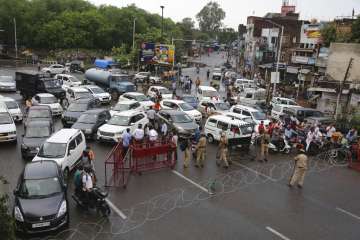Jammu and Kashmir's special status revoked; All questions answered
The Indian government, under Prime Minister Narendra Modi, on Monday proposed revoking the special constitutional status of Jammu and Kashmir, amid a heavy security crackdown. The constitutional provision forbids Indians from outside the region from buying land or permanently settling in Jammu and Kashmir.

The Indian government, under Prime Minister Narendra Modi, on Monday proposed revoking the special constitutional status of Jammu and Kashmir, amid a heavy security crackdown.
The constitutional provision forbids Indians from outside the region from buying land or permanently settling in Jammu and Kashmir.
Union Home Minister Amit Shah today moved the amendment amid uproar by opposition members in the Rajya Sabha. "I am presenting the resolution to revoke Article 370 in Jammu and Kashmir except the first clause 370 (1)," Amit Shah said.
The government also proposed to reorganize Jammu and Kashmir, carving out two separate Union Territories of Ladakh and Jammu and Kashmir. The Union Territory for Jammu and Kashmir will have a legislature but there will be no Assembly in Ladakh, Shah said in a statement.
Amit Shah said this had been done in view of constant threats of cross border terrorism.
The UT of Ladakh was a long pending demand of the people of the region and the decision was aimed at fulfilling the aspiration of the local population, the Amit Shah said.
Here are some questions and answers on the issue:
WHAT IS HAPPENING?
The BJP-led government today proposed revoking Article 370 of India's constitution, which confers special rights to permanent residents of the state of Jammu and Kashmir.
Home Minister Amit Shah says the long-standing rights that preceded India's independence from British rule in 1947 were "temporary" and that the government would abolish them.
To tackle any law and order situation, the region has been put under a heavy security cover, with prohibitory orders in place against public assembly. Top leaders from the state, including former chief ministers Omar Abdullah and Mehbooba Mufti, have been put under house arrest and internet and phone service have been cut.
Amit Shah proposed revoking Article 370 amid an uproar in India's upper house of Parliament, and was expected to address the lower house on the issue later Monday.
WHAT IS KASHMIR'S SPECIAL STATUS?
Article 35A of India's constitution permits the local legislature in Jammu and Kashmir to define permanent residents of the region. The article came into being in 1954 by a presidential order under the constitution's Article 370, which grants special autonomous status to Jammu and Kashmir state.
Article 35A forbids Indians from outside the state from permanently settling, buying land, holding local government jobs or winning education scholarships in the region.
The article, referred to as the Permanent Residents Law, also bars female residents of Jammu and Kashmir from property rights in the event that they marry a person from outside the state. The provision also extends to such women's children.
While Article 35A has remained unchanged, some aspects of Article 370 have been diluted over the decades.
HOW DID ARTICLE 35A COME ABOUT?
A 1927 order by the administration of the state of Jammu and Kashmir gave the state's subjects exclusive hereditary rights. Two months after India won independence from British rule in August 1947, Maharaja Hari Singh, the then-ruler of Jammu and Kashmir, signed a Treaty of Accession for the state to join the rest of the union, formalized in Article 370 of the Indian constitution.
Further discussions culminated in the 1952 Delhi Agreement, a presidential order that extended Indian citizenship to the residents of the state but left the maharaja's privileges for residents intact.
HOW CAN IT BE REPEALED?
Article 370(3) of the Indian constitution permits revocation of the law by presidential order. However, such an order must be introduced before the state's Constituent Assembly. Since that body was dissolved in 1957, experts have different views on the abrogation of the law, with some believing it needs approval by state lawmakers and others seeing a presidential order as sufficient.
The validity of Article 35A has been brought before India's Supreme Court. Bharatiya Janata Party members have said that if the court upholds the provision, the Narendra Modi-led government will revoke it by presidential order.
WHAT COULD HAPPEN IF IT'S SCRAPPED?
If Jammu and Kashmir's special status is repealed, people from the rest of India would have the right to acquire property in Jammu and Kashmir and settle there permanently.
People from the rest of the country can get a government job in the state.
Non-Kashmiri wedding will now take away the rights of a Kashmiri girl.
People from the rest of the country can win educational scholarships in the region.
(WITH AP INPUTS)